七年级英语下册复习资料
七年级下册英语知识点复习完整版

新目标英语七年级下册知识点总结Unit 1 Can you play the guitar1,情态动词+V原 can do= be able to do2,Play+ the+ 乐器+球类,棋类3,join 参加社团、组织、团体4,4个说的区别:say+内容Speak+语言Talk 谈论 talk about sth talk with sb talk to sb Tell 告诉,讲述 tell sb notto do sthTell stories/ jokes5,want= would like +sbto do sth6,4个也的区别:too 肯定句末前面加逗号Either否定句末前面加逗号Also 行前be 后As well 口语中前面不加逗号7,be good at+ V-ing=do well in 擅长于be good for 对…有益 be bad for对…有害be good to 对…友好 good 可用friendly,nice,kind替换be good with和…相处好=get on/ along well with8,特殊疑问句的构成:疑问词+一般疑问句9,How/ what about+V-ing …怎么样10,表建议11,10,感官动词look, sound, taste, smell, feel+adj/ like11,选择疑问句:回答不能直接用Yes或者No,要从中选择一个回答12,students wanted for school showwanted表示招募,含有被动意义13,show sth to sb=show sb sth give sth to sb=give sb sth14,help sb todo sthHelp sb with sthWith sb’s help= with the help of sbHelp oneself to 随便享用15,be busy doing sth/ be busy with sth16,need to do sth17,be free= have time18,have friends= make friends19,call sb at +电话号码20,on the weekend= on weekends21,English-speaking students 说英语的学生带有连词符,有形容词性质22,do kung fu表演功夫Unit 2 What time do you go to school1,问时间用what time或者whenAt+钟点 at 7 o’clock at noon/ at nightduring/ in the dayOn+ 具体某天、星期、特指的一天 on April 1st on Sunday on a cold winter morningIn +年、月、上午、下午、晚上2,时间读法:顺读法逆读法:分钟≤30用past five past eight8:05 half past eight8:30分钟>30用to a quarter to ten9:45整点用…o’clock 7 o’clock7:003,3个穿的区别:wear 表状态,接服装、手套、眼镜、香水等Put on 表动作,接服装Dress 表动作,接sb/ oneself get dressed穿衣3,感叹句:How+adj+主谓How+adj+a/an +n单+主谓What+ a/an +adj+ n单+主谓What+ adj+ n复/ 不可数+主谓4,from…to…5,be/ arrive late for6,频度副词行前be 后Always usually often sometimes seldom hardly never7,一段时间前面要用介词for for half an hour for five minutes8,eat/ have… for breakfast/ lunch/ dinner/ supper9,either…or10,a lot of=lots of11,it is +adj+for sb +to do sth adj修饰to do sthIt is important for me to learn English.it is +adj+of sb +to do sth adj修饰sb It is kind/ friendly/ nice of you to help me.Unit 3 How do you get to school1,疑问词How 如何方式how long 多长时间答语常用“For/ about +时间段”how far多远距离答语常用“It’s +数词 +miles/ meters/ kilometers”how often多久一次频率答语常用“Always/ often/ every day/…”或“次数+时间”等表频率的状语How soon多快,多久以后,常用在将来时中;答语常用“in +时间段”how many多少接可数名词 how much接不可数名词why为什么原因 what什么 when何时who谁 whom谁宾格针对宾语提问也可用who whose谁的2,宾语从句要用陈述句语序3,Stop sb from doing sthStop to do 停下来去做其他事Stop doing 停止正在做的事4,what do you think of/ about…= how do you like…你认为…怎么样5,6,He is 11 years old.He is an 11-year-old boy.7,many students= many of the students8,be afraid of sth be afraid to do sth worry about be worried about 担心9,play with sb10,come true10,have to do sth11,he is like a father to me like像12,leave离开 leave for 出发前往某地13,cross 是动词 across是介词14,thanks for +n/ V-ingThanks for your help/ thanks for helping me.Thanks for your invitation/ thanks for inviting/ asking me.Thanks to幸亏,由于,因为15,4个花费:人+spend/ spends/ spent+时间/钱+indoing sth/ on sth人+pay/ pays/ paid +钱+for sthIt takes/ took sb +时间+to do sth物+cost/ costs/ cost +sb +钱16,交通方式●用介词;在句子中做方式状语;①by +交通工具名词中间无需任何修饰By bus/ bike/ car/ taxi/ ship/ boat/ plane/ subway/ train……②by +交通路线的位置By land/ water/ sea/ air③in/ on +冠词/物主代词/指示代词 +交通工具名词In a/ his/ the carOn a/ his/ the bus/ bike/ship/ train/ horse/ motorbike④on foot 步行●用动词;在句子中做谓语;①take + a/ the +交通工具名词take a bus/ plane/ ship/ trainride a bike②walk/ drive/ ride/ fly to……后面接here,there,home等地点副词时,省略介词to;如步行回家:walk home17,名词所有格一般情况加’s Tom’s pen以s结尾加’ the teachers’ office ten days’ holiday表示几个人共同拥有,在最后一个名词后加’s Mike and John’s desk表示每个人各自拥有,在每个名词后加’s Mike’s and John’s desksUnit 4 Don’t eat in class.1,祈使句变否定在句首+don’tBe型be +表语,否定形式:don’t + be +表语 Be quiet,please. Don’t be late Do型实义动词+其他,否定形式:don’t +实义动词+其他Come here,please. Don’t play football here.Let型let sb do sth,否定形式:don’t + let sb do sth或者let sb not do sthNo+n/ V-ing No photos /mobile;No parking/ smoking/ spitting/ talking/ picking of flowers2,in class在课堂上 in the classroom 在教室3,be on time准时4,listen to music5,have afight with sb7,eat outside8,Must 与have to1must 表示说话人主观上的看法,意为“必须”; have to 表示客观的需要或责任,意为“不得不,必须”,后接动词原词;2must没有人称,时态和数的变化Have to 有人称,数,时态的变化,其第三人称单数形式为 has to ,过去式为had to. 构成否定句或疑问句时借助动词do/ does;3have to的否定式是needn’t=don’t/ doesn’t have to 不必要;must的否定式是must not/ mustn’t一定不能,不允许;9,Some of…10,bring…to…11,practice doingsth12,wash/ do the dishes13,on school days/ nights14,break/ followobeythe rules15,Be strict with sb/ oneself be strict in sth对……严格;16,too many“太多”修饰可数名词复数too much“太多”修饰不可数名词much too“实在太”修饰形容词或副词17,make one’s/ the bed18,get to, arrive in/at, reach,到达如果后面接地点的副词home,here或there ,就不用介词in ,at, to19,remember/ forget+to do要做+doing做过20,have fun,enjoy oneself,have a good/ great/ wonderful time+V-ingUnit 5 Why do you like pandas1,回答why的提问要用because2,Kind of 相当于副词,修饰形容词或副词,意为“稍微,有点”,与a little/ bit 相近A kind of 意为“一种”,some kinds of 意为“几种”,all kinds of 意为“各种各样的”;这里的kind 是“种,类,属”的意思;3,Why not =Why don’t you+V原你为什么不…4,walk on one’s legs/ hands on 意为“用…方式行走”5,all day =the whole day整天6,来自be/ come from where do they come from=where are they from7,more than=over超过 less than 少于8,once twice three times9,be in great danger10,one of……之一 +名词复数11,get lost12,with/ without 有/ 没有介词13,a symbol of14,由…制造 be made of能看出原材料be made from 看不出原材料be made in+地点表产地15,cut down 砍到动副结构代词必须放中间,名词可放中间或者后面Unit 6 I’m watching TV.1,现在进行时其结构为be的现在式am, is, are+ 现在分词V-ing;否定形式在be后面加not,疑问式将be动词提前2,动词-ing形式的构成:一般情况+ing;以不发音的e结尾的,去e加ing;重读闭音节结尾,末尾只有一个辅音字母,双写辅音字母再加ing3,go to the movies4,join sb for sth与某人一起做某事 join us for dinner5,live with sb live in+地点6,other,another与the otherOther “其他的,另外的”,后接名词复数,有时other+n复数=othersAnother “又一个,另一个”,泛指总数为三个或三个以上中的任意一个,后接名词单数;The other“两者中的另一个”,常与one连用,“one…the other…”表示“一个…,另一个…”7,talk on the phone8,wish to do sth9,Here is+ n单 Here are+ n 复Unit 7 It’s raining1.询问天气的表达方式:How’s the weather It’s a raining/sunny day. It’s raining.What’s the weather like It’s windy.2,play computer games3,How’s it/ everything going=How have you been4,5,In/ at the park6,Take a message for sb 替人留言Leave a message to sb 给人留言7,call sb back8,right now,right away,at once,in a minute,in a moment,in no time 立刻,马上9,right now现在 just now刚刚用于一般过去式10,over and over again10,the answer to the question,a key to the door,a ticket to the ball game11,by the pool12,summer vacation13,go on a vacation去度假 be on a vacation在度假14,write a letterto sb15,反意疑问句陈述句+附加疑问句反意疑问句中,陈述句用的肯定,后面的附加疑问句就要用否定;相反,陈述句用的否定,附加疑问句就要用肯定;16,adj 以-ing结尾“令人…的”exciting,interesting,relaxing以-ed结尾“人感到…的”excited,interested,relaxed17,in the first picture18,dry干燥的 humid潮湿的Unit 8 Is there a post office near here1,There is +单数可数名词/不可数名词+ 地点状语.There are +复数名词+地点状语.谓语动词要与跟它最近的那个名词一致就近原则;There be句型的否定式在be后加上not或no即可;注意not和no的不同:not是副词,no 为形容词,not a/an/any + n. 相当于no+ n.There be句型的一般疑问句变化是把be动词调整到句首There be表示“某处存在某物或某人”;have表示“某人拥有某物/某人”2,问路:①Is/ Are there……near here/ around here/ in the neighborhood②Where is/ are……③How can I get to……④Could/Can you tell me the way to……⑤Which is the way to……3,Across,cross,through,overAcross是介词,“横过,在对面”表示从物体表面穿过Cross是动词,相当于go/ walk acrossThrough是介词,表示从物体中间或里面穿过 go through the doorOver是介词,“横过,越过”表示从物体上空越过,跨过 fly over4,ask for help/ advice5,in/ on the street6,在某条大街上习惯用介词on on Bridge Street7,across from,next to,between…and…,behind8,in front of在…外部的前面→behind在…后面 in the front of在…内部的前面9,be in town→be out of town10,be far from11,go/ walk along go straight go up/ down12,turn left/right13,on one’s/ the left14,at the first crossing/ turning15,sometimes 有时频度副词 sometime将来有朝一日,曾经某天Some times 几次,几倍 some time 一段时间前面用介词for16,free 空闲的 free time自由的 as free as a fish免费的 The best things in life are free.17,enjoy doing18,Time goes quickly.19,表“一些”在肯定句中用some. 在疑问句和否定句中用any;特殊用法:some可用于表示盼望得到对方肯定的答复或表示建议、委婉请求的疑问句中;any也可用于肯定句中,表示"任何的";Unit 9 What does he look like1,what does he look like 询问人长什么样,回答:①主语+be+形容词/ 介词短语he is tall/ of medium height;②主语+have/has+形容词+名词she has long hairwhat does sb like 询问某人喜欢什么2,多个形容词修饰名词多个形容词修饰名词,一般关系近的靠近名词;音节少的在前,音节多的在后;限定词+数词序前基后+描绘性形容词+大小、长短、高低+新旧+颜色+国籍+材料+名词3,May be 为情态动词+动词原形,在句子中做谓语,maybe是副词,表示可能,大概,一般放在句首;4,a little,little修饰不可数名词,a little表示一点点,little表示几乎没有a few,few修饰可数名词,a few表示一点点,few表示几乎没有5, Find 强调找到的结果,look for 强调寻找的过程.6,问职业:what do you do=what is your job7,the same as→be different8,long straight brown hair9,最后in the end表事情结局finally强调次序at last强调经多番努力终于达成By the end of 直到……为止At the end of在……末端/尽头Unit 10 I’d like some noodles.1,名词可分为可数名词和不可数名词不可数名词作主语,谓语动词用单数;可数名词又分单数和复数;错误!一般+s;错误!以-s,-x,-ch,sh结尾的名词+es;错误!辅音+y,把y变i,再+es;错误!以-o结尾的,有生命的+es negro—negroes;hero—heroes;tomato—tomatoes;potato—potatoes;无生命的+s;⑤以f,fe 结尾的名词,改f,fe为v+es leaf—leaves;knife—knives例外:roofs,chiefs⑥单复数同形:sheep,deer.不规则变化:man—men;woman—women;child—children;foot—feet;tooth—teeth等2,would like sth. 想要某物Would you like some …你想要一些……吗——Yes, please./ ——No, thanks.would like to do sth. “想要做某事”;Would you like to … 你愿意去做……吗—Yes, I’d like / love to./—I’d like/ love to. But I’m too busy.would like sb to do sth “想要某人做某事”;3,order:order food take/ have one’s orderIn order to为了In the order按顺序Order/ book a room 预定房间Order sbnotto do sth命令4,special和especialSpecial特别的人或事物,特别的,特殊的,specials特色菜;specially专门地,特地Especial特别的,突出的,especially特别,尤其5, the number of表示“……的数量”,后面接可数名词复数;做主语时,主语是number而不是of后面的名词复数,因此谓语动词要用单数;a number of表示“许多”,相当于many, 后面接可数名词复数,做主语时,主语不是number 而是of后面的名词复数,因此谓语动词要用复数;Number前可用large,great,small修饰,不能用little;6,仍然,还:still肯定句Yet疑问句、否定句7,one bowl of two bowls of8,what size+nwould you like Large/ medium/ small9,what kind of10,大:big 体格大、笨重→small,little 形容具体的人或物Huge物体体积巨大=very bigLarge物体面积、空间、范围、数量大→small 不修饰人Great重大事件或行为,伟大,具有感情色彩11,肯定句中表并列用and 否定句、疑问句中表并列用or12,around the world= all over the world13,make a wish 14,blow out15,in/ at one go 16,get popular17,cut up动副结构18,bring good luck to19,different kinds of20,be short of缺乏Unit 11 How was your school trip1,一般过去时基本结构:主语+动词过去式+其他;否定形式:①was / were + not; ②在行为动词前加didn't,同时还原动词;一般疑问句:①Was/Were+主语+其他②Did+主语+动词原形+其他2,动词过去式规则变化:直接加ed;以不发音e结尾的单词,直接加d;以辅音字母+y结尾的,变y为i加ed;以元音字母+y结尾的,直接加ed;以重读闭音节结尾的,双写最后的辅音字母+ed不规则变化的动词过去式见书本最后一页3,How was your school trip = what was your school trip like4,Go for a walk5,Milk a cow6,Ride a horse7,Quite a lot8,Show sb around9,并列谓语的时态和数必须一致;10,In the countryside11,after that12,come out13,go on school trip14,along the way15,buy/ get sb sth= buy/ get sth for sb16,all in all17,否定转移主语为第一人称I 或者we时think,believe,suppose18,be interested in +n/ v-ing19,not at all20,diary entry21,Something意为“某事,有些事”;anything意为“任何事,任何东西”;everything意为“每一件事”其后的谓语动词要用单数;nothing意为“没事,什么事都没有”;Unit 12 What did you do last weekend1,go+V-ing与do some +V-inggo+V-ing表示“去从事某种活动”一般指户外go shopping/ swimming/ skating/ dancing/ skiing/ climbing/ camping/ hiking……do some +V-ing 表示“从事某种活动”一般指室内do some writing/ washing/ cooking/ cleaning/ reading……2,go to the cinema3,camp by the lake4,study for a test study for the English test5,work as a guide6,living habits7,stay up late8,shout at sb 因生气或愤怒向某人吼叫;shout to sb 对某人大声叫喊,目的是让人听见9,run away10,fly a kite11,adj修饰不定代词 adj要放后面 something important,anything interesting12,take sb to…带某人去……13,put up tents14,make a fire15,on the first night16,each other17,get a terrible surprise18,finish doing19,look out of…从……朝外看window,door……look out at sth 向外眺望……look out for 留神、注意、小心、关心20,feel/ watch/ see/ hear sb do sth强调整个过程feel/ watch/ see/ hear sb doing sth强调动作正在进行21,jump up and down22,wake up23,so +adj +that +结果状语从句“如此……以致……”eg:I was so busy that I didn’t go to sleep for 3 days.The weather was so cold that they had to stay at home.The coat is so expensive that I don’t want to buy it.so that 引导目的状语从句,以便,为了in order toeg:they got up early so that they could catch the early bus.I raise my voice so that I can make myself heard.。
七年级英语复习资料(精选5篇)

七年级英语复习资料〔精选5篇〕篇1:英语复习资料七年级 Play tennis/table tennis 打网球/乒乓球 Play the piano/guitar弹钢琴/吉他【结论:乐器前+the,球类前不+the】 Worry about担忧Would like to do sth想要做某事 get on well with sb与某人相处融洽be ready to do sth=get ready to do sth 准备做某事ride a bike/horse骑自行车/马that’s all而已on the board在布告板上class/PE/cleaning monitor 班长/体育委员/劳动委员just like就像,正如 fly a kite放风筝run fast跑得快 play the piano well弹钢琴弹得好the best score的成绩/分数promise to do sth承诺/保证做某事 Food and Drink Club饮食俱乐部What/How about+Ving?…怎么样?Choose ….as…选择…作为… Speak Chi nese讲汉语 Be good at =do well in 擅长…篇2:英语复习资料七年级习题:用所给词的正确形式填空1、I _______ ( have ) a soccer ball .2、She ______ ( have ) two __________ ( pingpong—ball ) .3、He ______ ( play ) sports every day .4、We ______ ( speak ) English .5、Tom ______ ( call ) Jim every day .6、My daughter ______ ( like ) apples .8、The girl ______ ( study ) English sometimes .9、The _______ ( boy ) often watch TV .10、Her uncle ______ ( go ) home on foot 。
七年级下册英语复习资料
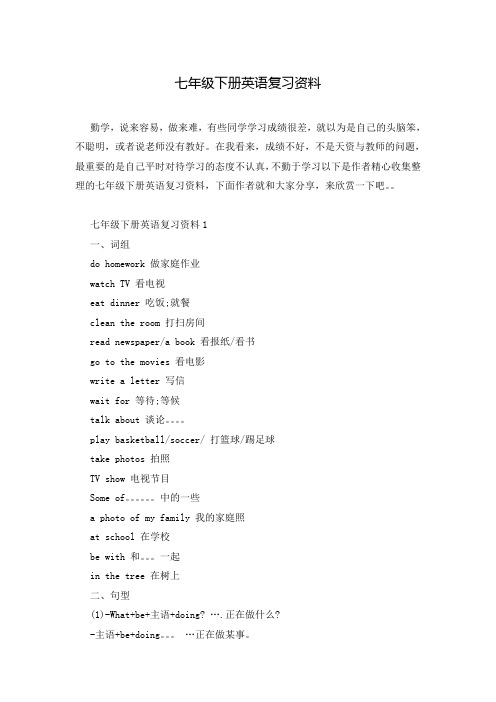
七年级下册英语复习资料勤学,说来容易,做来难,有些同学学习成绩很差,就以为是自己的头脑笨,不聪明,或者说老师没有教好。
在我看来,成绩不好,不是天资与教师的问题,最重要的是自己平时对待学习的态度不认真,不勤于学习以下是作者精心收集整理的七年级下册英语复习资料,下面作者就和大家分享,来欣赏一下吧。
七年级下册英语复习资料1一、词组do homework 做家庭作业watch TV 看电视eat dinner 吃饭;就餐clean the room 打扫房间read newspaper/a book 看报纸/看书go to the movies 看电影write a letter 写信wait for 等待;等候talk about 谈论。
play basketball/soccer/ 打篮球/踢足球take photos 拍照TV show 电视节目Some of。
中的一些a photo of my family 我的家庭照at school 在学校be with 和。
一起in the tree 在树上二、句型(1)-What+be+主语+doing? ….正在做什么?-主语+be+doing。
…正在做某事。
例:-what are you doing?-I’m doing my homework.(2)-Thanks for … 为。
而感谢例:Thanks for your letter.(3)-H ere are/is…例:Here are some of my photos.Here is a photo of my family.(4)-That sounds good.(5)-This TV show is boring.三、日常交际用语(1)-Do you want to go to the movices? –Sure.(2)-When do you want to go? –Let’s go at seven.(3)-Where do people play basketball? –At school.(4)-What’s he waiting for?-He’s waiting for a bus.(5)-What’s he reading? He’s reading a newspaper.1)现在在进行时的形式是:助动词be(am,is,are)+动词-ing形式(也叫现在分词),表示现在(说话的瞬间)正在进行或发生的动作。
初一英语下册复习资料

初一英语下册复习资料词汇Unit 1- geography:地理- continent:大洲- climate:气候- environment:环境- pollution:污染- global warming:全球变暖Unit 2- traditional:传统的- culture:文化- festival:节日- custom:俗- ceremony:仪式- mythology:神话Unit 3- century:世纪- invention:发明- revolution:革命- digital:数字的- technology:技术Unit 4- astronaut:宇航员- astronomer:天文学家- orbit:轨道- satellite:卫星- telescope:望远镜语法- 一般现在时:表示经常发生或普遍存在的事情,构成为主语+ 动词原形。
- 现在进行时:表示现在正在进行的动作,构成为主语 + be动词(am, is, are) + 现在分词。
- 一般过去时:表示过去发生的事情,构成为主语 + 动词过去式。
- 宾语从句:由连接词that, if, whether等引导的句子,作为动词的宾语,构成为主语 + (连接词)+ 从句。
阅读理解Passage 1Title: A Trip to the MountainsLast summer, my family and I went on a trip to the mountains. We spent a week in a small cabin near a lake. We hiked, fished, and went horseback riding. The scenery was amazing, with tall trees and clear blue skies.Questions1. Where did the family stay during the trip?2. What were some things the family did during the trip?3. What was the scenery like?Passage 2Title: My Favorite FoodMy favorite food is pizza. I like it with cheese, pepperoni, and mushrooms. I usually eat it on Friday nights while watching a movie.Questions1. What is the author's favorite food?2. What toppings does the author like on their pizza?3. When does the author usually eat pizza?写作介绍自己的朋友,包括姓名、年龄、外貌、兴趣爱好等。
七年级下册英语期末复习资料
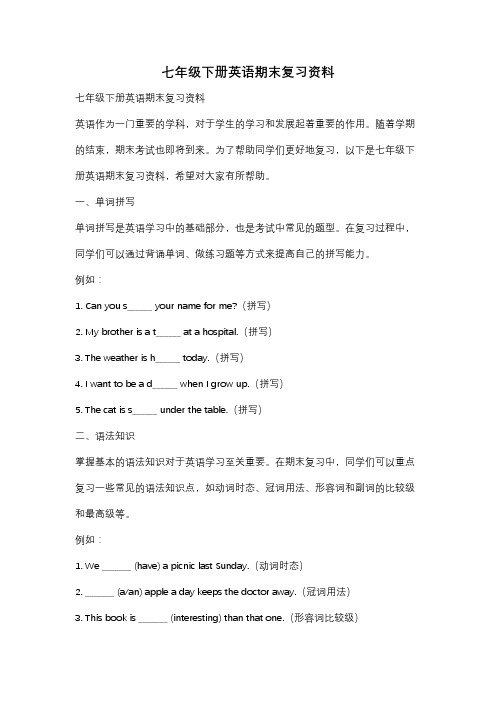
七年级下册英语期末复习资料七年级下册英语期末复习资料英语作为一门重要的学科,对于学生的学习和发展起着重要的作用。
随着学期的结束,期末考试也即将到来。
为了帮助同学们更好地复习,以下是七年级下册英语期末复习资料,希望对大家有所帮助。
一、单词拼写单词拼写是英语学习中的基础部分,也是考试中常见的题型。
在复习过程中,同学们可以通过背诵单词、做练习题等方式来提高自己的拼写能力。
例如:1. Can you s______ your name for me?(拼写)2. My brother is a t______ at a hospital.(拼写)3. The weather is h______ today.(拼写)4. I want to be a d______ when I grow up.(拼写)5. The cat is s______ under the table.(拼写)二、语法知识掌握基本的语法知识对于英语学习至关重要。
在期末复习中,同学们可以重点复习一些常见的语法知识点,如动词时态、冠词用法、形容词和副词的比较级和最高级等。
例如:1. We _______ (have) a picnic last Sunday.(动词时态)2. _______ (a/an) apple a day keeps the doctor away.(冠词用法)3. This book is _______ (interesting) than that one.(形容词比较级)4. She runs _______ (fast) in our class.(副词最高级)三、阅读理解阅读理解是考试中常见的题型,也是考察学生理解能力和阅读能力的重要方式。
在复习过程中,同学们可以多读一些英语文章,提高自己的阅读水平。
例如:My name is Lucy. I am twelve years old. I have a happy family. There are four people in my family. They are my father, my mother, my brother and me. My father is a doctor. He works in a hospital. My mother is a teacher. She works in a school. My brother is a student. He studies in a middle school. I am a student, too. I study in a primary school. We love each other and help each other.根据短文内容,判断下列句子的正误。
人教版七年级下册英语总复习
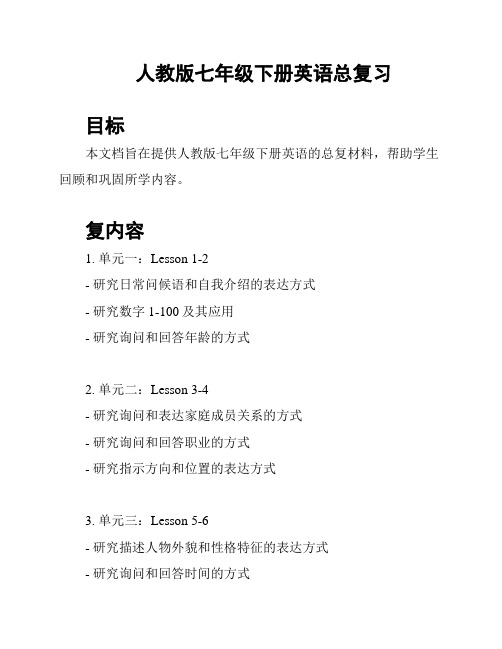
人教版七年级下册英语总复习
目标
本文档旨在提供人教版七年级下册英语的总复材料,帮助学生回顾和巩固所学内容。
复内容
1. 单元一:Lesson 1-2
- 研究日常问候语和自我介绍的表达方式
- 研究数字1-100及其应用
- 研究询问和回答年龄的方式
2. 单元二:Lesson 3-4
- 研究询问和表达家庭成员关系的方式
- 研究询问和回答职业的方式
- 研究指示方向和位置的表达方式
3. 单元三:Lesson 5-6
- 研究描述人物外貌和性格特征的表达方式
- 研究询问和回答时间的方式
- 研究表示频率的副词及其应用
4. 单元四:Lesson 7-8
- 研究描述人物喜好和日常活动的表达方式- 研究询问和回答能力和兴趣的方式
- 研究表达原因和结果的连词及其应用
5. 单元五:Lesson 9-10
- 研究描述家庭、房间和城市的表达方式- 研究询问和表达地点的方式
- 研究表示数量和价格的词汇及其应用
6. 单元六:Lesson 11-12
- 研究询问和回答日程安排的方式
- 研究表达喜怒和感受的形容词及其应用- 研究询问和表达能力和意愿的方式
复建议
- 复每个单元的重点词汇和常用句型
- 做相关单元的练题和听力练
- 跟读课文,注意语音和语调的准确性
- 制作复笔记,总结重点内容和常见问题- 参加口语练和模拟对话
祝愿同学们复习顺利,考试取得好成绩!。
七年级英语下册总复习
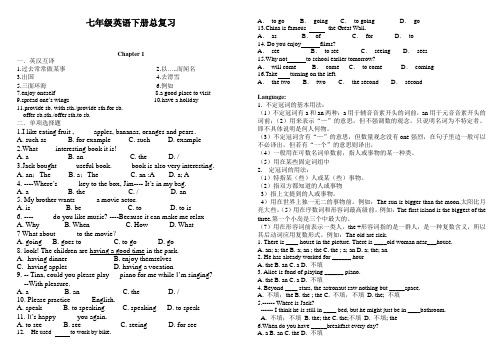
七年级英语下册总复习Chapter 1一.英汉互译1.过去常常做某事2.以…..而闻名3.出国4.去滑雪5.三面环海6.例如7.enjoy oneself 8.a good place to visit 9.spread one’s wings 10.have a holiday11.provide sb. with sth./provide sth.for sb.offer sb.sth./offer sth.to sb.二.单项选择题1.I like eating fruit ,_____ apples, bananas, oranges and pears.A. such asB. for exampleC. suchD. example2.What_____interesting book it is!A. aB. anC. theD. /3.Jack bought _____useful book._____ book is also very interesting.A. an;TheB. a;TheC. an :AD. a; A4. ----Where’s _____ key to the box, Jim---- It’s in my bag.A. aB. theC. /D. an5. My brother wants _____ a movie actor.A. isB. beC. toD. to is6. ----_____ do you like music? ----Because it can make me relaxA. WhyB. WhenC. HowD. What7 What about _____ to the movie?A. goingB. goes toC. to goD. go8. look! The children are having a good time in the park.A.having dinnerB. enjoy themselvesC.having applesD. having a vocation9. -- Tina, could you please play __ piano for me while I’m singing? --With pleasure.A. aB. anC. theD. /10. Please practice _____ English.A. speakB. to speakingC. speakingD. to speak11. It’s happy _____ you again.A. to seeB. seeC. seeingD. for see12. He used to work by bike. A.to go B.going C.to going D.go13.China is famous the Great Wall.A.as B.of C.for D.to14. Do you enjoy films?A.see B.to see C.seeing D.sees15.Why not to school earlier tomorrow?A.will come B.come C.to come D.coming16.Take turning on the left.A.the two B.two C.the second D.secondLanguage:1. 不定冠词的基本用法:(1)不定冠词有a和an两种:a用于辅音音素开头的词前,an用于元音音素开头的词前;(2)用来表示“—”的意思,但不强调数的观念,只说明名词为不特定者。
七年级英语下册的复习资料

七年级英语下册的复习资料想学好七年级英语,其中英语复习资料的学习是一项重要的内容。
以下是店铺给你推荐的七年级英语下册复习资料归纳,希望对你有所帮助!七年级英语下册的复习资料篇11.ving形式的构成1)直接在动词原形末尾加-ing,如play-playing2)以不发音字母e结尾的动词,去e再加-ing,如have-having3)以重读闭音节结尾的单词,结尾只有一个辅音字母,应双写这个字母,再加-ing。
如,begin-beginning2.注意:1) 有些动词一般不用于现在进行时,如see,like,love, want,know 等,而用一般现在时。
如,Do you know him?你认识他吗?2) 有些动词如come, go, arrive, leave, start, fly, drive,stay等表示位置转移的词,用现在进行时表示按计划即将发生的动作,如We are going to Beijing on Friday.我们星期五要去北京。
3. 构词知识:1) 名词后缀:-er,如,singer-or,如 actor-ing, 如 meeting-tion 如 direction2) 形容词后缀: -ful 如,beautiful-ing 如,boring-ous 如,dangerous-ly 如, friendly3)副词后缀:-ly 如,really4)数词后缀:-teen 如,thirteen-ty 如,thirty-th 如,fourth5)在国家名词后加-ian,-an, -n表示其国家的人。
如,Egypt埃及 Egyptian埃及人Europe欧洲 European欧洲人Canada加拿大 Canadian加拿大人Italy意大利 Italian意大利人Australia澳大利亚 Australian澳大利亚人America美国 American美国人6)在表示天气的名词后加-y如,wind-windy, fog-foggy,sun-sunny4. Until的用法:Until 和 till的意义相同,都有“直到”,“直到...才","在...以前不"的意思.它们的使用方法为:1) 作介词: 作介词,后面通常接表时间的名词或短语.如We are back until/till3o’clock.三点种我们才回来.2) 作连词:作连词时,until和till引导时间状语从句.如Go along this road until you see the park沿着这条路走,直到你看到公园为止。
七年级英语下册复习资料
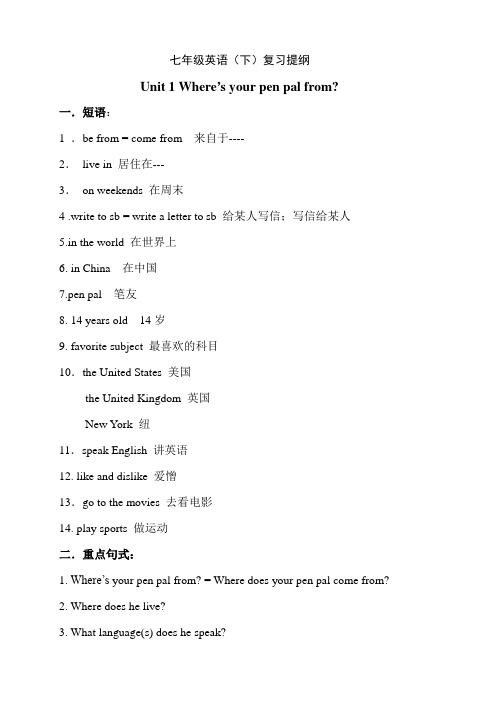
七年级英语(下)复习提纲Unit 1 Where’s your pen pal from?一.短语:1 .be from = come from 来自于----2.live in 居住在---3.on weekends 在周末4 .write to sb = write a letter to sb 给某人写信;写信给某人5.in the world 在世界上6. in China 在中国7.pen pal 笔友8. 14 years old 14岁9. favorite subject 最喜欢的科目10.the United States 美国the United Kingdom 英国New York 纽11.speak English 讲英语12. like and dislike 爱憎13.go to the movies 去看电影14. play sports 做运动二.重点句式:1. Where’s your pen pal from? = Where does your pen pal come from?2. Where does he live?3. What language(s) does he speak?4. I want a pen pal in China.5. I can speak English and a little French.6. Please write and tell me about yourself.7. Can you write to me soon?8. I like going to the movies with my friends and playing sports.三.本单元的国家,人民、语言对应1. Canada---- Canadian---- English / French2. France------ French------French3. Japan------Japanese----Japanese4. Australia----Australian----- English5 the United States------ American---- English6 the United Kingdom---British----- EnglishUnit 2 Where’s the post office?一.Asking ways: (问路)1.W here is (the nearest) ……?(最近的)……在哪里?2.C an you tell me the way to ……?你能告诉我去……的路吗?3.H ow can I get to ……?我怎样到达……呢?4.I s there ……near here / in the neighborhood? 附近有……吗?5.W hich is the way to ……?哪条是去……的路?二.Showing the ways: (指路)1. Go straight down / along this street. 沿着这条街一直走2. Turn left at the second turning. 在第二个路口向左转3. You will find it on your right. 你会在你右手边发现它4. It is about one hundred meters from here. 离这里大约一百米远5. You’d better take a bus. 你最好坐公交车去(You’d better+动词原形)三.词组1. across from ……在……的对面across from the bank 在银行的对面2. next to……紧靠……next to the supermarket 紧靠超市3. between……and……在……和……之间between the park and the zoo 在公园和动物园之间among 表示位于三者或三者以上之间4. in front of……在……前面There is a tree in front of the classroom. 课室前面有棵树in the front of……在……(内)的前部There is a desk in the front of the classroom.课室内的前部有张桌子5. behind……在……后面behind my house 在我家后面6. turn left/ right 向左/右拐on the left/right of……在某物的左/右边on the left of our school 在我们学校的左边on one’s left/right 在某人的左/右边on my left在我左边7. go straight 一直走8. down /along……沿着……(街道down/along Center Street 沿着中央街9. in the neighborhood=near here 在附近10 welcome to……欢迎来到……11. take /have a walk 散步12. the beginning of…………的开始,前端at the beginning of……在……的开始,前端in the beginning 起初,一开始13. have fun=have a good time=enjoy oneself 玩得开心,过得愉快我昨天玩得很开心I had fun yesterday.I had a good time yesterday.I enjoyed myself yesterday.14. have a good trip 旅途愉快15. take a taxi 坐出租车16. 到达:get to +地方get here/ there/ home 到这/那/家arrive in +大地方I arrive in Beijing.arrive at +小地方I arrive at the bank.reach +地方17.go across 从物体表面横过go across the street横过马路go through 从空间穿过go through the forest穿过树林18.on + 街道的名称Eg: on Center Streetat + 具体门牌号+街道的名称Eg: at 6 Center Street三.重难点解析1.enjoy doing sth 享受做某事的乐趣,喜爱做某事I enjoy reading. 我喜爱读书到目前为止,我们学了两个特殊的动词finish和enjoy,都是要带doing.I finish cleaning the room. 我扫完了这间屋子2.hope to do sth 希望做某事I hope to pass this exam. 我希望通过这次考试hope +从句I hope tomorrow will be fine. 我希望明天将会晴朗(从句即是一个小句子,这个小句子又放在大句子中,从属于大句子,所以叫从句如tomorrow will be fine是一个从句,它又放在I hope 的后面,形成句中有句)3. if 引导一个表示假设的句子If I have much money, I will go to the moon.如果我有许多钱,我就会去月球If you are hungry, you can buy some food in the supermarket.如果你饿了的话,你可以在超市买一些食物四.本单元的反义词、近义词配对1、new—old2、quiet--- busy 3 、dirty--- clean 4 、big---- smallUnit 3 Why do you like koala bears?一.重点词组eat grass eat leaves be quiet very shy very smart very cute play with her friends kind of South Africa other animals at night in the day every day during the day二. 交际用语1.Why do you like pandas?Because they’re very clever.2.Why does he like koalas?Because they’re kind of interesting.3.Where are lions from?They are from South Africa.4.What other animals do you like?I like dogs, too. Why?Because they’re friendly and clever.5.Molly likes to play with her friends and eat grass.6.She’s very shy.7. He is from Australia.8.He sleeps during the day, but at night he gets up and eats leaves. 9.He usually sleeps and relaxes 20 hours every day.10.Let’s see the pandas first.11.They’re kind of interesting.12.What other animals do you like?13.Why do you want to see the lions?三. 重点难点释义1、kind of 有点,稍微Koala bears are kind of shy. 考拉有点害羞kind 还有“种类”的意思如:各种各样的all kinds ofWe have all kinds of beautiful flowers in our school.2、China n. 中国Africa n.非洲China 和Africa都是专有名词,首字母都应该大写,而且和介词in连用There are many kinds of tigers in China.There are many kinds of scary animals in Africa.3、friendly adj.友好的,和蔼可亲的它是名词friend的形容词形式,常常和be动词连用, be friendlyThe people in Chengdu are very friendly to others.4、with prep. 跟,同,和…在一起I usually play chess with my father.注意区别与and的用法,and通常用于连接主语或宾语,连接主语时,如果有I, I通常放在and 之后,如:My father and I usually play chess together.Play with “和…一起玩耍”“玩…”I often play with my pet dog. Don’t play with water!5、day和night 是一对反义词,day 表示白天或一天,night表示夜或夜晚通常说in the day, during the day, at nightKoala bears often sleep during the day and eat leaves at night.6、leaf n. 叶子复数形式为:leaves, 类似的变化还有:wife—wives, wolf—wolves,knife—knives,scarf---scarfs (scarves)等7、hour n. 小时;点钟hour前边通常加上冠词an 表示“一个小时”,即:an hourThere are 24 hours in a day and 60minutes in an hour.8、be from 来自… Be from = come fromPandas are from China. = Pandas come form China.9、meat n. (食用的)肉,为不可数名词,表示“许多”时,使用much来修饰,即:much meat He eats much meat everyday.10、grass n.草,为不可数名词,表示“许多”时,使用much来修饰,即:much grassThere is much grass on the playground.四. 语法知识特殊疑问句通常以“what”、“who”、“which”、“when”、“where”、“how”、“how old”、“how many”等开头,对某一具体问题进行提问特殊疑问句的基本构成有两种情况:1. 疑问句+一般疑问句结构这是最常见的情况例如:What’s your grandfather’s telephone number?你爷爷的电话号码是多少?Who is that boy with big eyes? 那个大眼睛的男孩是谁?Which season do you like best? 你最喜欢哪个季节?When is he going to play the piano? 他什么时候弹钢琴?Where does he live? 他住在哪儿?How are you?你好吗?How old are you? 你多大了?How many brothers and sisters do you have? 你有几个兄弟姐妹?2. 疑问句+陈述句结构这时疑问词作主语或修饰主语例如:Who is on duty today? 今天谁值日?Which man is your teacher? 哪位男士是你的老师?我们学过的What/How about+名词/代词+其他?也是特殊疑问句,它是一种省略结构例如:I like English. What/How about you?我喜欢英语你呢?What about playing basketball?打篮球怎么样?Unit 4 I want to be an actor.一.短语:1 want to do sth 想要作某事2 give sb sth = give sth to sb 给某人某物/ 把某物给某人3 help sb do sth 帮助某人作某事Eg: I want to help my mother do some housework at home.4 help sb with sth 帮助某人谋事Eg: I want to help my mother with some housework at home5 in the day 在白天6 at night 在晚上7 talk with/ to sb 和----谈话8 be busy doing sth 忙于做某事Eg: He is busy listening to the teacher.9 in a hospital 在医院10 work/ study hard 努力工11 Evening Newspaper 晚报二.重点句式及注意事项:1 询问职业的特殊疑问词是what;有三种主要句式①What + is / are + sb? Eg. What is your mother?②What + does/ do + sb + do? Eg. What does his brother do?③What + is/ are + 名词所有格/ 形容词性物主代词+ job? Eg . what is your job?2 People give me their money or get their money from me.3 Sometimes I work in the day and sometimes at night.4 I like talking to people.5 I work late. I’m very busy when people go out to dinners.6 Where does your sister work?7 then we have a job for you as a waiter.8 Do you want to work for a magazine? Then come and work for us as a reporter.9 Do you like to work evenings and weekends?10 We are an international school for children of 5-12.三.本单元中的名词复数1 policeman--policemen2 woman doctor--women doctors3 thief--thieves 4.apple tree--apple treesUnit 5 I’m watching TV一.现在进行时Ⅰ现在进行时的用法表示现在(说话瞬间)正在进行或发生的动作Ⅱ现在进行时时间状语及标志性词○1now 现在○2at the momen t现在○3look 看(后面有明显的“!”)○4listen 听(后面有明显的“!”)Ⅲ现在分词的构成①一般在动词结尾处加ing Eg: go—going look--looking②以不发音字母e结尾的动词,去e加ing Eg:write—writing close--closing③以重读闭音节结尾的动词,如果末尾只有一个辅音字母,应先双写这个字母,再加ing.Eg: get—getting run—running ( swim, run, put,get,sit,begin)Ⅳ现在进行时的构成肯定句: 主语+ am/is/are+ doing +其他+时状. Eg: He is doing hishomework now.否定句:主语+am/is/are +not+ doing+其他+时状. Eg: He is not doing his homework now.一般疑问句:Am/Is/Are +主语+ doing+其他+时状?Eg: Is he doing his homework now?肯定回答:Yes,主语+am/is/are Eg Yes, he is.否定回答:No, 主语+am not/isn’t/aren’t Eg: No, he isn’t. 二.短语:1.do one’s homework 做某人的作业do housework 做家务2.talk on the phone 在电话里交谈,talk about……谈论……talk to(with)sb 和某人交谈3.write a letter 写信write a letter to sb 给某人写信4.play with……和……一起玩5.watch TV看电视TV show 电视节目6.wait for sb/sth 等待某人/某物7.some of…………中的一些8.in the first photo 在第一张照片里(介词用in,序数词前面有the)in the last photo 在最后一张照片里 a photo of one’s family 某人的家庭照片9.at the mall 在购物街at/in the library 在图书室at/in the pool 在游泳池10.read a book = read books = do some reading看书\阅读11.thanks for = thank you for为某事而感谢(后接动词要用v-ing)三.重点句式及注意事项:1.他正在干什么?What is he doing? 他正在吃饭He is eating dinner.他正在哪里吃饭?Where is he eating dinner他正在家里吃饭He is eating dinner at home.2.你想什么时候去?When do you want to go? 让我们六点钟去吧Let’s go at six o’clock.3.他正在等什么?What is he waiting for? 他正在等公交车He is waiting for a bus.4.他们正在和谁说话?Who are they talking with?他们正在和Miss Wu说话They are talking with Miss Wu.5.你们正在谈论什么?What are you talking about?我们正在谈论天气We are talking about the weather.6.他们都正在去上学They are all going to school.7.这儿是一些我的照片Here are some of my photos.这儿是一些肉Here is some of meat.(some of meat不可数,故用is)8.谢谢你帮我买这本书Thank you for helping me buy this book. 9.family 家;家庭强调“整体”,是单数;强调“成员”时,是复数His family has a shower. 他们家有一个淋浴His family are watching TV. 他全家在看电视Unit 6 It’s raining!一.短语:1 take photos/ pictures照像2 take photos/ pictures of sb/ sth给某人或某物照相3 have a good time\have fun\have a great tame 玩得愉快4 work for sb / sth为某人工作Eg: Yuan Yuan works for CCTV’s Around The World show5 on vacation度假Eg: There are many people here on vacation.6 some…others…一些…另外一些…one…the others…一个…另一个…(两者之间)Eg: There are many students in the classroom. Some are writing, others are reading.7 put on 穿上(动作)wear 穿着(状态)Eg: Tom is putting on his coat now.8 on the beach在沙滩上Eg: Tom and his family are playing on the beach at this moment.9 this group of people这一群人10. in this heat 二.重点句型1.How is the weather? 天气怎么样?In the raining. 在下雨2.What are you doing? 你正在做什么?I'm watching TV. 我在看电视3.What are they doing? 他们在做什么?They are studying. 他们在学习4.What is he doing? 他在做什么?He is playing basketball . 他在打篮球5.What is she doing ? 她在做什么?She is cooking . 她在做饭三.重难点解析1、询问天气情况的句式:(横线内容可替换)①How is the weather in Beijing? (How is the weather today?)②What’s the weather like in Beijing? ( What’s the weather like today?)2、回答上面问题的句式:①It’s + adj. (形容词) Eg: It’s windy.3 、How’s it going (with you)?①Not bad. ②Great! ③Terrible!④Pretty good.4、Thank you for joining CCTV’s Around The Word show.5、I am surprised they can play in this heat.6、Everyone is having a good time.7、People are wear ing hats and scarfs.①wear 指穿衣服的状态②put on 指穿衣服的动作Please put on your old clothes四.谈论天气的日常用语1. It’s sunny/rainy/cloudy. 今天是晴天/雨天/阴天2. Lovely weather,isn’t it? 天气真好,是吗?3. It looks like rain. 看起来要下雨4. It’s raining cats and dogs. 正是瓢泼大雨5. It seems to be cleaning up. 天似乎要转晴6. It’s blowing hard. 风刮得很大7. It’s snowing heavily. 正在下大雪8. The snow won’t last long. 雪不会持续太久9. It’s very fogg y. 雾很大10. The fog is beginning to lift. 正在收雾11. It’s thundering and lightening. 雷电交加12. What’s the weather like today? 今天天气怎么样?13. What’s the weather report for tomorrow? 天气预报明天怎么样?14. It’s quite different from the weather report. 这和天气预报相差很大15. It’s rather changeable. 天气变化无常16. What’s the temperature? 温度是多少?17. It’s two below zero. 零下二度18. The temperature has dropped a lot today. 今天温度低多了Unit7 What does he look like?一.短语1. look like 看起来像....2. curly /short/straight/long hair 卷/短/直发3. medium height/build 中等高度/身体4. a little bit 一点儿…5. a pop singer 一位流行歌手 6 .have a new look 呈现新面貌7. go shopping (do some shopping) 去购物8. the captain of the basketball team篮球队队长9. be popular with sb 为---所喜爱10. one of --- ---中的一个11 .stop to do sth 停下来去做某事12. stop doing sth 停止正在做的事情13 .tell jokes/ stories 讲笑话/ 讲故事14. have fun doing sth 愉快地做某事15. remember ( forget) to do sth 记得(忘记)做某事(没有做的)16 . remember (forget) doing sth 记得(忘记)做过某事(已做)二.本单元的重点句:1.Is that your friend? No, it isn’t.2. What does she look like?3. I think I know her. ( I don’t think I know her.)4. Wang Lin is the captain of the basketball team.5. She’s a little bit quiet. 6 .Xu Qian loves to tell jokes.7 .She never stops talking. 8 .She likes reading and playing chess.9. I don’t think he’s so great. 10. I can go shopping and nobody knows me.11. Now he has a new look.三.重难点解析1. What does/ do +主语+ look like? 询问某人的外貌特征,看上去什么样?Eg: What does your friend look like?2. 形容头发时,可按照先长短,后曲直,最后说颜色的顺序说(长形色)Eg: She has long curly black hair.3. one of + 名词复数,谓语动词要用“单三”形式Eg: One of his friends is a worker.4. 不定代词做主语时,谓语动词要用“单三”形式修饰不定代词词,应该放在它的后面.Eg: I can go shopping and nobody knows me.5.He is …(通常为形容词,包括身高、体形等)He has…(通常为形容词修饰的名词,包括头发、五官)He wears…(穿、戴、留可以是衣服、帽子、鞋子等,也可以是眼镜、手表、胡须)6.I don’t think…的用法表达否定的看法I don’t think she is good-looking.(否定主观态度)Unit 8 I'd like some noodles一.短语1.beef and tomato noodles\noodles with beef and tomato 牛肉西红柿面chicken and cabbage noodles mutton and potato noodlestomato and egg noodles beef and carrot noodles 2.would like to do sth \want to do s.th 想要作某事3.what kind of noodles什么种类的面条4.what size bowl of noodles 什么大小碗型的面5.a large\medium\small bowl of noodles 大\中\小碗的面6.ice cream冰淇淋orange juice桔汁green tea绿茶RMB人民币phone number7.House of Dumplings\noodles饺子\面馆Dessert House甜点屋二.重点句型1.What kind of vegetables\meat\ drink food would you like?I’d like ……I’d like chicken and cabbage noodles.2.What kind of noodles would you like? I’d like beef noodles.3.What kind of noodles would you like? I’d like chicken and cabbage noodles.4.What size bowl \plate of noodles would you like?5.I’d like a large \ medium\small bowl noodles.6. What size cake would you like? I would like a small birthday-cake.三.重难点解析1.would like 想要(表示一种委婉的语气)其用法相当于want.would like + 名词would like an apple (want an apple)would like to do sth He would like to play soccer.----Would you like to see the dolphins? ----Yes, I’d like to. (1)would 是情态动词,没有人称和数的变化,可与人称代词缩写为’d, 与其它情态动词一样可帮助完成疑问句和否定句(你能举出例子吗?)我想要些牛肉I’d like some beef.她想去打乒乓球She would like to play ping-pang. (你能变否定句和疑问句吗?)(2) Would you like sth.? 是提建议的一种句型,如需用一些,用some而不用any.肯定回答是:Yes, please./ All right./ Yes./OK. 其否定回答是:No, thanks.2.What kind of noodles would you like?kind 在此句中作“种类”讲,a kind of 一种,all kinds of 各种各样的kind of 有几分A cat is a kind of animal. There are all kinds of animals in the zoo The cat is kind of smart.3.Can I help you?你要买什么? 肯定Yes, please . I would like ……否定No, thanks.Unit 9 How was your weekend一.短语1. play +运动play soccer play tennis play sportsplay the + 乐器play the guitar play with…和某人\物玩耍2.have +三餐have breakferst \lunch \ supper3. study for…clean the room visit sb stay at homehave a party talk show4.go to the beach go to the movies go for a walk go to the mountains5.go shopping\do some shopping \go to the shop 买东西6.last weekend\over the weekend 上周末on weekends 每周末7.on +某日+morning\afternoon\evening (或具体的某一天) in + morning\afternoon\eveningin+世纪\年\月\季节at +时刻last (next) month\year\week8.what about+n\v-ing\pren=how about ……呢9. spend the weekend last week 度过上周的周末10.it’s time to do sth=it’s time for sth 该做么的时候了11.look for寻找.....二,重点句型和语法1.一般过去时表示过去发生的动作或存在的状态,通常与过去的时间状语连用:yesterday ,last week(month,year)(1)系动词be的过去时: am(is) →was, are →were陈述句:He was at home yesterday.否定句:He wasn’t at home yesterday.疑问句:Was he at home yesterday? Yes ,he was./No ,he wasn’t.(2)行为动词的一般过去时:陈述句:主语+动词过去式+其它I go to the movie. →I went to the movie.否定句:主语+助动词didn’t+动词原形+其I don’t go to school today. →I didn’t go to school.一般疑问句:Did +主语+动词原形+其它Do you have breakfast? →Did you have breakfast?Yes,I do./No,I don’t. Yes,I did./No,I didn’t.(3)规则动词的过去式变化规则动词不规则变化:do →did have →had go →went see →saw read →read get →gotgive →gave sleep →slept eat →ate write →wrote find_---found2.what’s the date today? It’s …3.What was the date yesterday? It was…What’s the weather like today? It’s …?4.How was your weekend?6.What did she do ?She did her homework7.What did he do last weekend ?He played soccer8..It’s time to go home= It’s time for homeUnit 10 Where did you go on vacation?一.短语1.go on vacation go to summer camp stay athomestudy for exams Central Park show sth to sb.help him find his father walk back to…go shoppingthe Palace Museum think of have fun doing sth.bus trip the Great Wall Tian’an Men Square.a Beijing Hutong make sb do sth.decide to do sth all day二.重点句子和注意事项1.Where did you go on vacation? I went to summer camp.Where did they go on vacation? They went to New York City.Where did he go on vacation? He stayed at home.Where did she go on vacation? She visited her uncle.2.Did you/he/she/they go to Central Park?Yes, I/he/she/they did. No, I/he/she/they didn’t.3.How were the movies?They were fantastic4.have fun doing something干某事有乐趣=enjoy oneself doing somethingWe have fun learning and speaking English .We enjoy ourselves learning and speaking English . 我们学英语有很多乐趣.5.find sb. doing sth. 发现某人在干某事find sb. do sth. 发现某人干过某事I find him reading the novel (小说). I found him go into the room .6.corner角落,角,拐角处in the corner 在角落里(指在建筑物里面)at the corner 在拐角处(指在建筑物外面或道路的拐角)My bike is at the corner .7.be lost 迷路了=get lost , lost (adj.) The girl was lost in the big city .8.help sb. (to) do sth.=help sb for sth 帮助某人干某事He always helps us learn English9. make sb. do sth. 让/使某人干某事let / have sb. do sth. do前不带toThe movie makes me relaxing . Let the boy do his homework alone .10. feel+ adj. 感到...I feel hungry / tired /happy /excited11. decide to do sth. 决定干某事They decided to go toHainan on vacation .Uint 11 What do you think of game shows?一.词组1.. TV shows(电视节目)soap opera sitcom a comedy an action movie a documentary a thriller cartoon Beijing OperaAnimal World Tell it like it is Law Today game show CCTV News News in 30 Minutes Man and Nature nese Cooking Around China talk show Lucky52 rts news sports show Culture China2. write an article for the school magazine.给学校杂志写一篇文章3. a thirteen - year - old boy.一个十三岁的男孩4. wear colorful clothes.穿着颜色鲜艳的衣服5. interview sb. 采访某人 in fact. 实际上6. wear scarves. 戴着围巾7 .think of 想起,考虑到二.重点句型1. What do you think of soap operas? I can't stand them.2. What do you think of sports shows? I don't mind them.3. What does she think of "Hilltop High"? She doesn't like it.4. What does Tony think of Tommy? He likes him.5. What do they think of Amanda? They love her.三.重难点解析1. wear (v. 动词) "穿,戴,佩"根据不同宾语,翻译不同的汉语意思wear earrings 戴耳环 wear a dress 穿连衣裙wear a watch 戴手表wear a beard 蓄胡子wear long hair 留长发2. think "想,考虑,思索"(v. 动词)可以和许多介词搭配,组成新的意思A:think of "考虑";"有...的看法",有时等于think about.What does he think of Beijing Opera?他对京剧有什么看法?My mother always thinks of everything!我妈妈总是想到所有的东西think highly of sb. /sth. 对某人或某物评价甚高Mr Black thinks highly of his son. 布莱克先生对他儿子评价甚高B:think about "考虑"(指计划,观念,看它是否相宜、可行)He is thinking about going to China.他正在考虑去中国3. too与either的区别too"也",表示肯定意义,与肯定的表达方法连用;而either"也不",表示否定意义,与否定的表达方法连用(1)—My brother likes to play soccer.我哥哥喜欢踢足球—I do, too.我也是(喜欢)(2)—My brother doesn't like to play soccer.我哥哥不喜欢踢足球—I don't, either.我也不喜欢also也可以表示"也",但一般情况下,too和either放在句子之后,also放在动词之前We also love talk shows.我们也喜欢访谈节目4. a thirteen - year - old boy 一个十三岁的男孩此结构中,year用单数形式,且用连字符,这种结构用作定语a five - month - old baby 一个五个月大的婴儿5. enjoy (v. 喜爱,享受)enjoy后面接名词、代词或动名词,注意与like/ love用法的区别like/ love 还可以接动词不定式(to do)I enjoy the soap operas.我喜爱肥皂剧I enjoy watching the soap operas.我喜爱看肥皂剧但我们不能说:I enjoy to watch the soap operas.只能说:I like / love to watch the soap operas.6. mind 表示"介意,反对"的意思时,通常用在疑问句、否定句中Would you mind opening the window?请你打开窗子好不好?He doesn't mind the cold weather at all.他一点都不在乎寒冷的天气多用于以下句型:(表示请求或征求意见)后接动名词/名词/代词Would you mind (doing) ...? Do you mind (doing) ...?7. stand 表示忍受(多用于否定句、疑问句)He can't stand the hot weather.他忍受不了炎热的天气Can you stand the pain?你忍受得了疼吗?9. What do you think of ...? 你认为...怎么样?(谈论对某事物的喜好程度)可选择的回答有:(1)I like it. (2)I don't mind it.(3)I don't like it. (4)I can't stand it. (5)I like it very much.(6)I love it. (7)It's beautiful. (8)They're fantasticUnit 12 Don't eat in class.一.短语.1. in class 在课上2. on school nights 在上学的晚上3. school rules 校规4. no talking 禁止交谈5. listen to music 听音乐6. have to 不得不7. take my dog for a walk 带狗去散步8. eat outside 在外面吃饭9. in the hallway 在走廊上10. wear a uniform 穿制服11. arrive late for class 上学迟到12. after school 放学后17. be in bed 在床上13. practice the guitar 练习弹吉它14. in the cafeteria 在自助食堂里15. meet my friends 和我朋友见面16. by ten o'clock.十点之前18. the Children's Palace 少年宫19. help my mom make dinner 帮助我妈做饭二.重点句型1.Don’t arrive late for school=Don’t be late for school2.Don’t fight =3.Don’t listen to music in the classroom.4.Don’t run in the hallways5.Don’t smoke .It’s bad for your health.6.Don’t play cards in school7.Don’t talk in class 8.Don’t watch TV on school nights.9.Don’t sleep in class. 10.Don’t play sports in the classrooms.11.Don’t sing songs at night. 12.Don’t talk when you eat.13.Don’t wear hats in class. 14.Do homework by 10:00.15.Clean your house! 16.Make the bed.17.Can we ……? Yes ,we can . No, we can’t.Eg:Can we arrive late for class ? No, we can’t. We can’t arrive late for class.18.Do you have to wash your clothes? Yes, I do./No, I don’t.三.重难点解析:1. 情态动词have to 的用法,意思是"必须、不得不",它侧重于客观上的必要和外界的权威(1)结构:主语+have to+动词原形+其他(一般现在时,主语是第三人称单数时,用has to;句子是过去时,用had to.)如:We have to wear sneakers for gym class. 在体育课上,我们必须穿运动鞋Tom has to practice the guitar every day. 汤姆每天必须练习弹吉它I had to get up at 5:00 am last Monday. 上周一,我不得不早上5点起床(2)否定形式:主语+don't have to+动词原形+其他(一般现在时,主语是第三人称单数时,用doesn't have to. 句子是过去时,用didn't have to)如:Nick doesn't have to wear a uniform. 尼克不必穿制服We didn't have to do our homework at once. 我们不必马上完成作业(3)疑问句:Do (Does或Did)+主语+have to +动词原形+其他如:Do you have to stay at home on weekends? 周末你必须呆在家里吗?Yes, I do. / No, I don't.是的,我必须不,我不必Did he have to go to bed by 11:00 last night? 昨晚,他不得不11点前上床睡觉吗?2. 情态动词can的用法(1)表示能力,"会""能"(在第一册中已经学习这种用法)Can you play the guitar? 你会弹吉它吗?Judy can speak a little Chinese. 朱蒂会说一点中文I can dance and sing. 我能唱歌又能跳舞(2)表示允许、许可,"可以"、"能"(在这一课中新学的词义)Can the students run in the hallways? 学生们可以在走廊上跑吗?We can eat outside. 我们可以在外面吃东西Can I come in? 我能进来吗?注意同样是情态动词,can 和have to 的用法是有区别的,和大部分情态动词一样,can在否定句中,直接在can后加上not,在疑问句中,把can放到主语前面,并且没有人称和数的变化3. hear,listen和sound都有"听"的意思,但三者是有区别的(1)hear"听说",侧重于"听"的内容I'm sorry to hear that you are ill. 听说你生病了,我很难过I never heard such an interesting story. 我从来没听过这么有趣的一个故事(2)listen"听"侧重于"听"这一动作Listen to me carefully. 认真听我说The children like to listen to music. 孩子们喜欢听音乐(3)sound"听起来",它是系动词,后面接形容词等That sounds great. 那听起来真不错It sounds like fun. 听起来挺有趣4. be in bed "在床上、卧床"in 和bed之间不能用冠词,bed也不用复数He is in bed for 10 years. 他卧床10年了Dave has to be in bed early every night.大卫每晚必须很早睡觉5. arrive late for 与be late for 意思相近,"迟到"Don't arrive (be)late for school. 上学别迟到I arrived (was)late for the meeting yesterday. 我昨天开会迟到了6. No talking ! "禁止交谈!"no后面加上名词或动名词(doing)也表示不要做某事与don't +do的用法相似No wet umbrellas! / Don't put wet umbrellas here! 禁止放湿雨伞!No food! Don't eat food here! 禁止吃食物!No smoking! Don't smoke here! 禁止吸烟!7.语法(祈使句)祈使句是用来表示请求、命令、叮嘱、号召或者劝告等的句子,这类句子的主语常是第二人称you,也就是听话者,因而you常省去了祈使句的开头是动词原形如:Look out! 小心!Wait here for me! 在这等我!Be sure to come here on time! 务必准时来到这里!祈使句的否定形式多以do not(常缩写成don't)开头,再加上动词原形Don't arrive late for school. 上学别迟到Don't fight! 别打架!Don't look out of the window. 不要向窗外看。
英语七年级下册复习资料

英语七年级下册复习资料初中英语学习是重中之重,七年级下册学习内容的掌握将为日后的英语学习奠定基础。
下面将为大家介绍七年级英语下册复习资料。
一、词汇英语词汇是学习英语的基础,下面将介绍常用词汇和短语。
1. 常用动词:like, love, hate, play, watch, study, read, listen to, sing, dance等。
2. 常见生活场景中的短语:(1)在学校:go to school, study English, have lunch, take an exam等。
(2)在家里: watch TV, do homework, listen to music, play the piano等。
(3)在电影院:watch a movie, buy popcorn, have fun等。
二、语法语法是英语学习的难点,以下为重要语法知识点。
1. 一般现在时:be动词、一些基本动词的用法,如:I am..., He likes....2. 现在进行时:be动词+现在分词的构成方式,表示现在正在发生的事情,如:She is listening to music.3. 宾语从句:由连接词that引导的从句,作为及物动词或介词的宾语,如: She said that she was happy.三、阅读理解阅读理解是英语测试的重要部分,下面建议大家阅读英语短文,尝试去理解文中的主旨和细节。
认真阅读短文,然后回答问题是提高阅读能力的有效方法。
四、听力理解听力理解重在听懂,并不要求说得很好。
平时可以听一些英语歌曲和英语广播,在听的过程中,将听到的单词和短语做一下简单的笔记。
五、口语口语练习非常重要,可以利用在线语音测试系统,或者参加英语培训班。
还可以找一些英语角、实践中的外国友人进行练习。
平时多练习读出英语句子,对于提高口语也很有好处。
以上是七年级英语下册的复习资料。
在复习的过程中需要掌握知识点,还需巩固和拓展知识。
(完整版)七年级英语(下册)1_3单元复习资料全
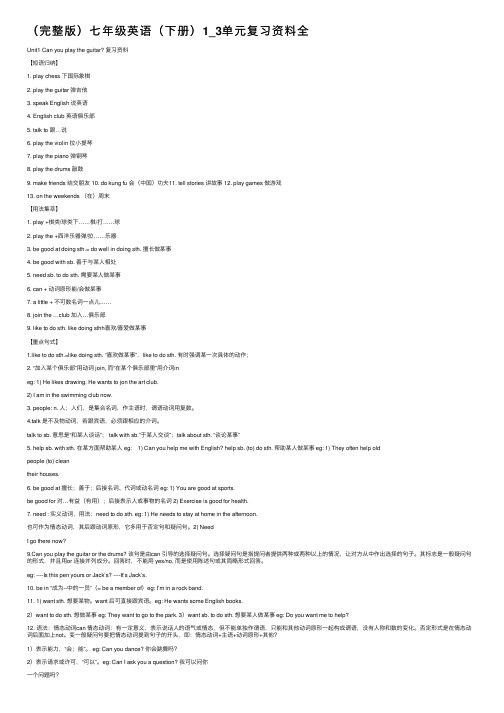
(完整版)七年级英语(下册)1_3单元复习资料全Unit1 Can you play the guitar? 复习资料【短语归纳】1. play chess 下国际象棋2. play the guitar 弹吉他3. speak English 说英语4. English club 英语俱乐部5. talk to 跟…说6. play the violin 拉⼩提琴7. play the piano 弹钢琴8. play the drums 敲⿎9. make friends 结交朋友 10. do kung fu 会(中国)功夫11. tell stories 讲故事 12. play games 做游戏13. on the weekends (在)周末【⽤法集萃】1. play +棋类/球类下……棋/打……球2. play the +西洋乐器弹/拉……乐器3. be good at doing sth.= do well in doing sth. 擅长做某事4. be good with sb. 善于与某⼈相处5. need sb. to do sth. 需要某⼈做某事6. can + 动词原形能/会做某事7. a little + 不可数名词⼀点⼉……8. join the …club 加⼊…俱乐部9. like to do sth. like doing sthh喜欢/喜爱做某事【重点句式】1.like to do sth.=like doing sth. “喜欢做某事”,like to do sth. 有时强调某⼀次具体的动作;2. “加⼊某个俱乐部”⽤动词 join, ⽽“在某个俱乐部⾥”⽤介词ineg: 1) He likes drawing. He wants to jon the art club.2) I am in the swimming club now.3. people: n. ⼈;⼈们,是集合名词,作主语时,谓语动词⽤复数。
七年级下册英语单元知识点归纳完整版
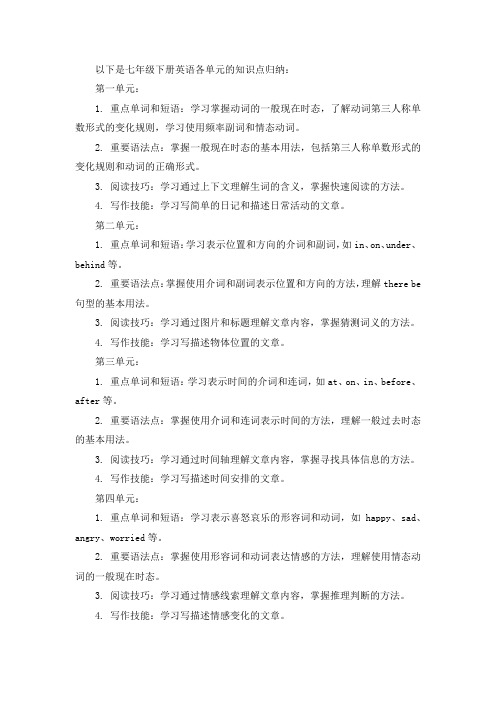
以下是七年级下册英语各单元的知识点归纳:第一单元:1. 重点单词和短语:学习掌握动词的一般现在时态,了解动词第三人称单数形式的变化规则,学习使用频率副词和情态动词。
2. 重要语法点:掌握一般现在时态的基本用法,包括第三人称单数形式的变化规则和动词的正确形式。
3. 阅读技巧:学习通过上下文理解生词的含义,掌握快速阅读的方法。
4. 写作技能:学习写简单的日记和描述日常活动的文章。
第二单元:1. 重点单词和短语:学习表示位置和方向的介词和副词,如in、on、under、behind等。
2. 重要语法点:掌握使用介词和副词表示位置和方向的方法,理解there be 句型的基本用法。
3. 阅读技巧:学习通过图片和标题理解文章内容,掌握猜测词义的方法。
4. 写作技能:学习写描述物体位置的文章。
第三单元:1. 重点单词和短语:学习表示时间的介词和连词,如at、on、in、before、after等。
2. 重要语法点:掌握使用介词和连词表示时间的方法,理解一般过去时态的基本用法。
3. 阅读技巧:学习通过时间轴理解文章内容,掌握寻找具体信息的方法。
4. 写作技能:学习写描述时间安排的文章。
第四单元:1. 重点单词和短语:学习表示喜怒哀乐的形容词和动词,如happy、sad、angry、worried等。
2. 重要语法点:掌握使用形容词和动词表达情感的方法,理解使用情态动词的一般现在时态。
3. 阅读技巧:学习通过情感线索理解文章内容,掌握推理判断的方法。
4. 写作技能:学习写描述情感变化的文章。
第五单元:1. 重点单词和短语:学习表示建议和请求的句型和表达方式,如Can you help me?、How about going shopping?等。
2. 重要语法点:掌握使用情态动词表示建议和请求的方法,理解使用一般现在时态的祈使句。
3. 阅读技巧:学习通过对话理解文章内容,掌握猜测词义的方法。
4. 写作技能:学习写建议信或请求信。
七年级下册英语复习资料
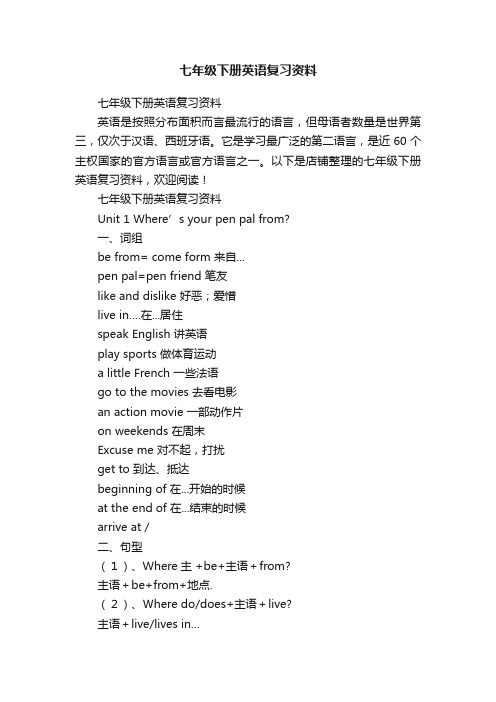
七年级下册英语复习资料七年级下册英语复习资料英语是按照分布面积而言最流行的语言,但母语者数量是世界第三,仅次于汉语、西班牙语。
它是学习最广泛的第二语言,是近60个主权国家的官方语言或官方语言之一。
以下是店铺整理的七年级下册英语复习资料,欢迎阅读!七年级下册英语复习资料Unit 1 Where’s your pen pal from?一、词组be from= come form 来自...pen pal=pen friend 笔友like and dislike 好恶;爱憎live in….在...居住speak English 讲英语play sports 做体育运动a little French 一些法语go to the movies 去看电影an action movie 一部动作片on weekends 在周末Excuse me 对不起,打扰get to 到达、抵达beginning of 在...开始的时候at the end of 在...结束的时候arrive at /二、句型(1)、Where主 +be+主语+from?主语+be+from+地点.(2)、Where do/does+主语+live?主语+live/lives in…(3)、What language do/does +主语+speak? 主语+speak/speaks….(4)、主语+like/likes+doing…三、日常交际用语1-Where is your pen pal from?-He’s from C hina.2-Where does she live?--She lives in Tokyo.3-Does she speak English?-Yes,she does/No,she dosen’t.4-Is that your new pen pal?-Yes,he is /No,he isn’t.5-What language does she speak?-She speaks English.Unit 2 Where’s the post office一、词组post office 邮局pay phone 投币式公用电话next to 在...隔壁across from 在...对面in front of 在...前面between…and… 在...和...之间on a street 在街上in the neighborhood 在附近on the right/left 在右边/在左边on one’s right/left 在某人的右边/左边turn right/left 向右/左转take a walk 散步have fun 玩得开心the way to …去...的路take a taxi 打的/乘出租车go down(along)…沿着...走go through...穿过..have a good trip 旅途愉快二、句型(1)、Is there a bank near here?Yes,there is .It’s on Centre Street.No,there isn’t.(2)、Where’s the sumpermarket?It’s next to the library.(3)、Bridge Street is a good place to have fun.(4)、I hope you have a good trip.(5)、If you are hungry,you can buy food in the restaurant.(6)、Talk a walk though the park..(7)、enjoy后接名词或动词-ing形式.Do you enoy(=like) your work?Do you enjoy(=like) living in the city?三、日常交际用语(1)、Is there a ….?句型Eg:-Excuse me.Is there a hotel in the neighborhood.-Yes, there is. No.there isn’t(2)、Where is …?句型Eg:-Where is the park,pleaase?-It’s behind the bank.(肯定回答)-I’m sorry I don’t know. (否定回答)(3)、Which is the way to +地点? 句型.例如:- Which is the way to the library.(4)、How can I get to +地点?句型.例如:-How can I get to the restaurant?(5)、Can you tell me the way to +地点?句型.例- Can you tell me the way to the post office?(6)、Let me tell you the way to my house.(7)、Just go straight and turn left.Unit 3 Why do you like koalas?一、词组want to do sth .想要做某事want sb to do sth 想要某做某事want sth 想要某物Let sb do sth 让某人做某事kind of 有几分种类a kind of 一种……years old …年龄如:ten years old 十岁like to do sth 喜欢做某事like doing sthplay with … 与...一起玩be quiet 安静during the day 在白天at night 在夜间have a look at.. 看...one…the other 一个...另一个...二、句型(1)、-why do you like pandas?-Because they’re very cure.(2)、-Why dose he like koalas?-Because they are kind of interesting. (3)、-Where are lions from?-Lions are from South Africa.(4)、-What animals do you like?-I like elephants.三、日常交际用语(1)、-Let’s see the lions.(2)-Why do you want to see the lions?-Becase they are very cute.(3)-Do you like giraffes?Yes,I do./ No,I don’t(4)-What other animal do you like?_I like dogs.tooother+ 名词的复数.表示没有特定的数量范围the other+名词的.复数表示有特定的数量范围.(5)-Why are you looking at me?-Because you are very cute.(6)-Let us play games. –Great!Let me see.Unit 4 I want to be an actor.一、词组want to be+职业想要成为……shop assistant 店员bank clerk 银行职员work with 与……一起工作work hard 努力工作work for 为……而工作work as 作为。
七年级下册英语复习资料
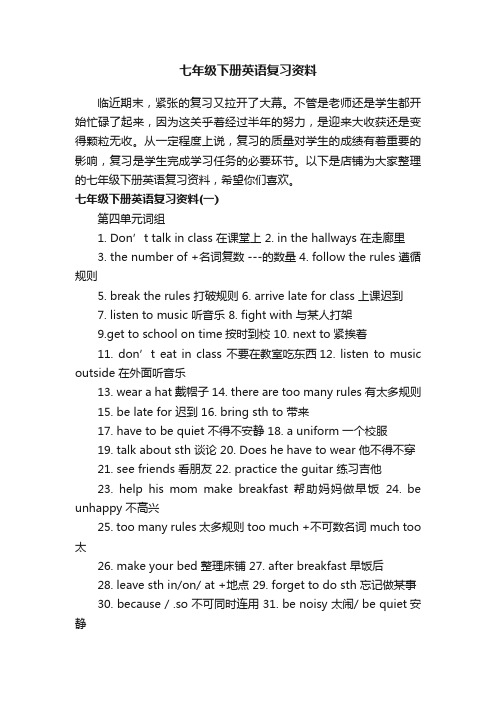
七年级下册英语复习资料临近期末,紧张的复习又拉开了大幕。
不管是老师还是学生都开始忙碌了起来,因为这关乎着经过半年的努力,是迎来大收获还是变得颗粒无收。
从一定程度上说,复习的质量对学生的成绩有着重要的影响,复习是学生完成学习任务的必要环节。
以下是店铺为大家整理的七年级下册英语复习资料,希望你们喜欢。
七年级下册英语复习资料(一)第四单元词组1. Don’t talk in class 在课堂上2. in the hallways 在走廊里3. the number of +名词复数 ---的数量4. follow the rules 遵循规则5. break the rules 打破规则6. arrive late for class 上课迟到7. listen to music 听音乐 8. fight with 与某人打架9.get to school on time按时到校 10. next to紧挨着11. don’t eat in class 不要在教室吃东西12. listen to music outside 在外面听音乐13. wear a hat 戴帽子 14. there are too many rules 有太多规则15. be late for 迟到 16. bring sth to 带来17. have to be quiet 不得不安静 18. a uniform 一个校服19. talk about sth 谈论 20. Does he have to wear 他不得不穿21. see friends 看朋友 22. practice the guitar 练习吉他23. help his mom make breakfast 帮助妈妈做早饭24. be unhappy 不高兴25. too many rules太多规则 too much +不可数名词 much too 太26. make your bed 整理床铺 27. after breakfast 早饭后28. leave sth in/on/ at +地点 29. forget to do sth 忘记做某事30. because / .so 不可同时连用 31. be noisy 太闹/ be quiet安静32. how do you feel 你感觉怎么样 33. feel well 感觉好34. tell sb to do sth 告诉某人做某事 35. think about it 考虑它36. on weekends 在周末 37. be strict with sb in sth 对某人某事严格要求38. remember to do 记住做某事 39. make rules to help us 制定规则做某事40. follow sb to do sth 跟着某人做某事 41. a school uniform 一个校服42. keep my hair short 保持头发短 43. play with my friends44. relaxing +物 . relaxed 人 45. learn to do 学做某事46. learn from sb 向----学习 47. have fun doing 有趣做某事48. have to go to the kitchen to get food for sb 不得不去厨房拿食物给某人49. write a letter to 写信给某人 50. want sb to do sth 想让某人做事51. it’s best to do sth 最好做某事【用法集萃】1. Don’t + 动词原形+其他,不要做某事。
初中英语七年级下册复习资料
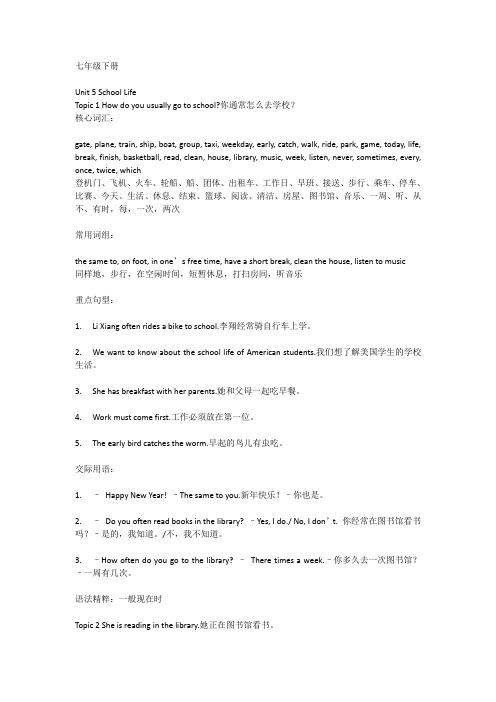
1.What’s your home like?你的家是什么样的?
2.You can rent your single room to Bob for¥280 per month.你可以以每月280元的价格把你的单人房租给鲍勃。你可以以每月280元的价格把你的单人房租给鲍勃。
3.I hear you playing the piano.我听见你在弹钢琴。
3.She has breakfast with her parents.她和父母一起吃早餐。
4.Work must come first.工作必须放在第一位。
5.The early bird catches the worm.早起的鸟儿有虫吃。
交际用语:
1.–Happy New Year!–The same to you.新年快乐!–你也是。
语法精粹:现在进行时的用法。
Topic 3 My school life is very interesting.我的学校生活很有趣。
核心词汇:
subject, history, math, art, geography, P.E., science, Monday, Tuesday, Wednesday, Thursday,学科,历史,数学,艺术,地理,体育,科学,星期一,星期二,星期三,星期四,
7.The traffic is heavy and the cost of living is high.交通拥挤,生活费用高。
语法精粹:一般现在时
Topic 2 She is reading in the library.她正在图书馆看书。
核心词汇:
常用词组:
playground, lab, room, gym, classroom, building, pool, card, soon, physics, borrow, shelf, course, keep, return, pleasure, purse, money, else, plan, center, left, attention, news, between, movie, show, program, world, stamp, exercise, because, talk, Japanese, wonderful操场,实验室,房间,健身房,教室,大楼,游泳池,卡片,不久,物理,借阅,书架,课程,保管,归还,娱乐,钱包,钱,其他,计划,中心,左,注意,新闻,中间,电影,表演节目,世界,邮票,运动,因为,谈话,日语,精彩
七年级下册英语知识点归纳总结

七年级下册英语知识点归纳总结七年级下册英语知识归纳1【重点短语】1. lost and found box 失物招领箱2. wele back 欢迎回来3. first of all 首先4. here is/are... 这有...5. from now on 从现在开始6. be careful with 小心保管7. whose bag 谁的包8. talk to sb. 与某人交谈9. mobile phone 移动电话,手机10. get on 上车 ( get off 下车)11. two thousand 两千 (thousands of 数以千计的...)12. look for 寻找13. at the moment 现在14. in a hurry 匆忙地15. alot of 许多,大量16. hundreds of 数以百计的17. on the train 在火车上18. every day 每天19. such as 例如20. make a list of 列一张...的清单21. ask/answer questions 问/回答问题【重点句型】1. Wele back to school! 欢迎回到学校!2. Whose bag is this? 这是谁的书包?3. It’s mine. 它是我的。
4. Are these crayons yours? 这些是你的蜡笔吗?5. Whose tapes are these? 这些是谁的磁带?6. Here’s a purple wallet! 这儿有个紫色钱包。
7. I think it’s Betty’s. 我认为它是贝蒂的。
8. Everyone, please be careful with your things from now on. 请大家从今以后仔细对待你们的东西。
9. People often lose things when they’re travelling or when they’re in a hurry. 当人们旅行或在匆忙中时,他们经常丢东西。
(完整)新版人教版七年级英语下册期末总复习资料

新版人教版七年级英语下册总复习资料第一单元词组1. Play the guitar 弹吉他3. join the music club 加入俱乐部5. match -- with 与 ---- 匹配7. the swimming club 游泳俱乐部9. a sports club 一个体育俱乐部 11. the story telling club 讲故事俱 13. let ' s join 让我们加入 2. what to do sth 想做 某事 4. speak English 说英语 6. play chess 下棋 8. what club 什么俱乐部 10. be good at telling stories 擅长讲故事 12. like to do/doing 喜欢做某事 14. sounds good 听起来好 15. stude nts wan ted for School Shov 学校表演招聘学生 16. talk to /with 跟某人谈话 17. after school 放学后19. show sb sth=show sth to sbE 某物展示某人20. play games with people 和人们做游戏21. be in the school music club 学校音乐俱乐部 22. n eed sb to do sth 需要某人做某事27. help sb with sth 帮助某人做某事 28.English-speaking students 说英语的学生29. play the piano 弹钢琴 31. it +adj +for sb to sth 33. help for old people 对老人的帮助30. tell sth stories 给某人讲故事32. be good with 和某人相处好34. make friends with 和某人交朋友35. in July / on the morning of 36. be free / be busy37. the Students ' Sports cen 学生的运动中 38. teach sb to do sth 教某人做某事39. need help to teach music 需要帮助来做某事40. the teacher do what he can to help students 老师做他能做的事来帮助学生用法集萃play +棋类/球类 下 ..... 棋,打 ... 球 play the +西洋乐器 弹/拉 ... 乐器be good at doing sth.= do well in doing sth. 擅长做某事典句必背Can you draw? Yes, I can. / No, I can ' t.What club do you want to join? I want to join the chess club.You can join the English club. Sounds good.I can speak English and I can also play soccer. Please call Mrs. Miller at 555-3721.18. do kung fu 表演功夫23. have fun doing 做事情很有趣24. on the weekend 在周末 25. call sb at 给某人打电话 26. help+sb +v 帮助某人be good with sb. 善于与某人相处can + 动词原形 能 /会做某事 join the …cli 加入…俱乐部 爱做某事need sb. To do sth.需要某人做某事 a little + 不可数名词 一点儿 like to do sth. =love to do sth.第二单元词组35. have a healthy life 有一个健康的生活方 式 用法集萃at +具体时间点 在几点(几分)eat breakfast/lu nch/di nn er 吃早饭/午饭/ 晚饭thirty\half past + 基数词 ...... 点半fifteen\a quarter to + 基数词 差一刻 到 ... 点from …to •从 .... 到 .... need to do sth 需要做某事典句必背1. What time do you usually get up? I usually get up at six thirty.2. That 's a funny time for breakfast.3. When do students uasually eat dinner?They usually eat dinner at a quarter to seven in the evening.4. In the evening, I either watch TV or play computer games.5. At twelve,she eats lots of fruit and vegetables for lunch..6. She knows it 's not good for her, but it tastes good.7. Here are your clothes.1. go to school 去上学 3. get dressed 穿衣服 5. eat breakfast 吃早饭2. get up 起床4. brush teeth 刷牙6. take a shower 洗澡7. what time 什么时间9. an interesting job 一个有趣的工作11. always /usually/ often/ sometimes/ never13. from --- t o 从哪里到哪里15. a funny time 一个有趣的时间17. be late for 迟到19. on weekends 在周末21. half past six 六点半23. a quarter to seven 七点差一刻25. take a walk 散步27. half an hour 半个小时29. either --- or 或者 ---- 或者31. lots of /a lot of 许多33. taste good 尝起来好佳作赏析主题:谈论日常作息习惯My School DayI am a student. I usually get up at seven, and I eat breakfast at seven thirty. Then I goto school at eight. School starts at eight thirty. I eat lunch at taelve. I go home at 17:00. Ioften eat dinner at 19:00 and then play the piano. I do my homework at 20:00. At 22:00,I go to bed.第三单元词组1. get to school 到达学校3. take the subway 乘地铁 5. how do you get to school 怎么到达学校7. how far is it 多远 8. how long does it take sb todo sth 花费某人多长时间做某事9. ten minutes ------ how long 11. ride the bike to school 骑自行车到学校 13. walk to , drive to ,fly to 15. about= around 大约 17. good exercise 好的锻炼 19. get home 到达家 21. in his father 坐父亲的车10. ten minutes ' -w---a-l-k- h ow far12. every day 每天14. I ' m not sur 我不敢确信16. 10 kilometers away from 十公里远 18. walk to school 步行去学 20. drive his car to work 开车去上班 25. crossing the river is 穿过河是22. n eed about 10 mi nutes to get to schoo 需要十分钟的时间到达学校23. I want to know where Bob lives 我想知道鲍勃住到哪24. what do you think of =how do you like 你觉得怎么样26. it is easy to get to school=it ' s+ adj. +foi 到达学》校6很容易27. there is 就近原则 28. between -- and 在两者之间29. no= not any =not a 30. the river run quickly 河水流的快31.quickly 动作上 fast 速度上 soon 时间上 32. on a ropeway 在索道上33. go on a ropeway to cross the river 坐索道穿过河 37. love to do 喜欢做某事34. an 11-year-old boy — 个 11 岁大的男孩 35. ten minutes ' walk /- ma i nteunte walk 10 分钟的路 36. be afraid to do, be afraid of sth / doi ng 害怕做某事 38. be like a father to me 像父亲一样做某事40. leave sth at/ on /in +地点把某物留在某地44. thanks for +n /doing sth 为什么而感谢46. at about 8:00 在大约 8 点用法集萃take …to …=go to … 乘•““去…2. take the train 乘火车 4. ride a bike 骑自行车6. one hundred and five 105 39. leave for . 离开到某地41. come true 实现43. why ----- b ecause42. why not +v 原形45. how to do it 怎么来做它How do / does (sb) get to …?是怎样到…的?How far is it from …to从…?到…有多远?It takes sb. some time to do sth. 做某事花费某人多长时间。
七年级英语下册-全册知识点梳理
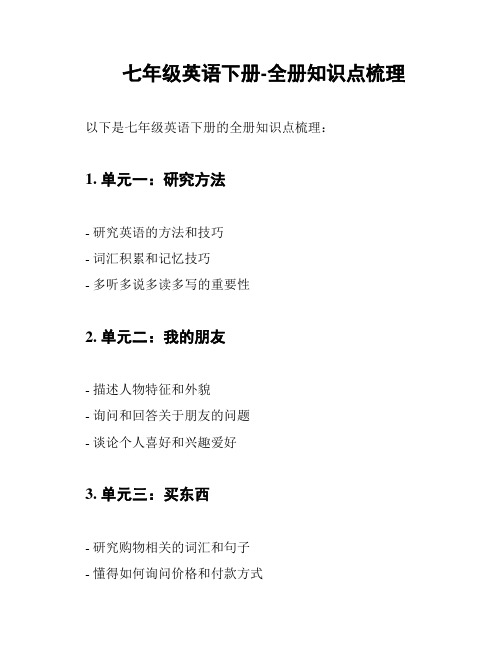
七年级英语下册-全册知识点梳理以下是七年级英语下册的全册知识点梳理:
1. 单元一:研究方法
- 研究英语的方法和技巧
- 词汇积累和记忆技巧
- 多听多说多读多写的重要性
2. 单元二:我的朋友
- 描述人物特征和外貌
- 询问和回答关于朋友的问题
- 谈论个人喜好和兴趣爱好
3. 单元三:买东西
- 研究购物相关的词汇和句子
- 懂得如何询问价格和付款方式
- 学会表达自己的购物意愿和偏好4. 单元四:我的学校
- 研究学校相关的词汇和句子
- 描述学校和课堂环境
- 谈论研究内容和学科
5. 单元五:我的生活
- 研究日常生活相关的词汇和句子- 描述自己的生活惯和家庭
- 谈论日常活动和时间安排
6. 单元六:我的假期
- 研究度假和旅行相关的词汇和句子- 描述过去和将来的假期计划
- 谈论旅行经历和感受
7. 单元七:我喜欢运动
- 研究运动项目和运动器材的词汇
- 喜欢和不喜欢的表达方式
- 谈论个人的体育运动经验和兴趣爱好
这份文档梳理了七年级英语下册的全册知识点,希望对你的学习有所帮助。
- 1、下载文档前请自行甄别文档内容的完整性,平台不提供额外的编辑、内容补充、找答案等附加服务。
- 2、"仅部分预览"的文档,不可在线预览部分如存在完整性等问题,可反馈申请退款(可完整预览的文档不适用该条件!)。
- 3、如文档侵犯您的权益,请联系客服反馈,我们会尽快为您处理(人工客服工作时间:9:00-18:30)。
七年级英语下册复习资料2.ving形式的构成1)直接在动词原形末尾加-ing,如play-playing2)以不发音字母e结尾的动词,去e再加-ing,如have-having3)以重读闭音节结尾的单词,结尾只有一个辅音字母,应双写这个字母,再加-ing。
如,begin-beginning注意:1)有些动词一般不用于现在进行时,如see,like,love, want,know等,而用一般现在时。
如,Do you know him?你认识他吗?2)有些动词如come, go, arrive, leave, start, fly, drive,stay等表示位置转移的词,用现在进行时表示按计划即将发生的动作,如We are going to Beijing on Friday.我们星期五要去北京。
3.构词知识:1) 名词后缀:-er,如,singer-or,如actor-ing, 如meeting-tion 如direction2) 形容词后缀:-ful 如,beautiful-ing 如,boring-ous 如,dangerous-ly 如,friendly3)副词后缀:-ly 如,really4)数词后缀:-teen 如,thirteen-ty 如,thirty-th 如,fourth5)在国家名词后加-ian,-an, -n表示其国家的人。
如,Egypt埃及Egyptian埃及人Europe欧洲European欧洲人Canada加拿大Canadian加拿大人Italy意大利Italian意大利人Australia澳大利亚Australian澳大利亚人America美国American美国人6)在表示天气的名词后加-y如,wind-windy, fog-foggy,sun-sunny4.Until的用法:Until 和till的意义相同,都有“直到”,“直到...才","在...以前不"的意思.它们的使用方法为:1) 作介词: 作介词,后面通常接表时间的名词或短语.如We are back until/till3o‟clock.三点种我们才回来.2) 作连词:作连词时,until和till引导时间状语从句.如Go along this road until you see the park沿着这条路走,直到你看到公园为止。
【注意】1)以上的状语从句的例句都是从句在主句之后,如果把从句放在主句之前,那么,引导词用till.如Till you come back, I won‟t leavehere.直到你回来我才回离开这。
3)主句的动作是终止性的,要用not…until/till句型。
5.“违反规矩“的现在进行时态1) 现在进行时比哦按时目前这一段时间内的活动或现阶段正在进行的动作。
而说话时并不一定正在进行。
如Is Tom working hard this term?汤姆这学期学习用功吗?They are working on the farm these days.这些日子他们在农场劳动。
2) 表示往返或位置转移的动词,如come,go,leave, stay, start, arrive等构成的现在进行时,可表示按计划或安排即将发生的动作。
这些动词还可以和表示将来的时间状语,如tomorrow, next week, next year等连用。
They are leaving for Beijing tomorrow.明天他们要动身去北京。
4)现在进行时与always, often等词相结合,也可表示习惯的,经常重复的动作。
意思是“老是”,“总是”。
此时常带有一定的感情色彩,如:埋怨,赞赏等。
如Mary is always talking about her son.玛利总是谈论她的儿子。
【注意】一些表示状态和意愿的动词,如be,like,want,know ,think,have等,不能用于现在进行时态中。
如,I want to go home now.6. 关于how 的用法1) How作“(指程度)多少”“(方法)怎样”“多么”讲,为副词。
2)how 的感叹句的构成:How + 形容词+主语+be动词!How+副词+主语+谓语动词!3)how many 多少(对可数名词的数量提问,其后接名词复数)How many days are there in a year?4) how much 多少(钱)(对不可数名词的数量提问,其后接不可数名词)How much water is there in the cup?How much are these pants?5) how often多久(对表示频度副词的时间状语提问)How often do you go there? Once a month.6)how old多大岁数(对年龄提问)How old is your grandfather? He is sixty-five.7)how soon多久(用于将来时)How soon are you back? In a week.◆unit10 Where did you go on vacation?目标语言:Talk about past events重点句型:Where did Tina go on vacation? She went to the mountains.Where did he go on vacation? He stayed at home.Did you go t o Central Park? Yes, I did. No, I didn‟t.Did he go to Central Park? Yes, he did. No, he didn‟t.How was your vacation? It was pretty good.How was the weather? It was hot and humid.How were the people? They were unfriendly.We had great fun playing in the water.The shops were too crowded, so I didn‟t really enjoyed it.I found a little boy crying in the corner.重点词组:stay at home, go to New York City, summer camp, go to the mountains, on vacation, Central Park, go to the movies,pretty good, bus trip, have fun doing, go shopping, in the corner, help sb, do sth, make sb. do sth. decide to do sth, discuss sth with sb, write a report on sth , be lost 知识点:1.英语不规则动词变化( BookI – Book III)A B Chear heard heard learn learnt learnthave/has had hadleave left leftlend lent lentlose lost lostmake made mademean meant meantsend sent sentspell spelt spelt shoot shot shotsit sat satsmell smelt smelt spend spent spentspit spat spat stand stood stood understand understood understood hang hung hunghold held held light lit lit meet met metfind found found feed fed fedspit spat spat bear bore bornwin won won build built built babysit babysat babysat flee fled fled lead led led mislead misled misled bend bent bent bleed bled bled hold held held smell smelt smeltdig dug dug deal dealt dealtA B Ceat ate eaten fall fell fallen do/does did done choose chose chosenbreak broke broken am/is was been are were beenfly flew flown forbid forbade forbidden forget forgot forgotten freeze froze frozen get got gotten go went gone hide hid hidden lie lay lain mistake mistook mistaken see saw seen shake shook shaken speak spoke spoken steal stole stolen take took taken wake woke woken wear wore worn A A B beat beat beatenA B Arun ran run come came come become became becomeA A AA Bcan couldmay mightwill wouldshall shouldA Amust must不规则中寻规则:a) 过去式与动词原形同形cost cost costput put putfit fit fitcut cut cutlet let lethurt hurt hurtset set setshut shut shutread read readhit hit hitb)原形以ow/aw结尾,过去式则变成ewgrow grew grownthrow threw thrownknow knew knowndraw drew drewshow showed shownc)将动词原形中的元音字母i改成a,变成过去式。
swim swam swumsink sank sunkring rang runggive gave givendrink drank drunksing sang sungbegin began begun【特例】win won wond)过去式以ought或aught结尾think thought thoughtbring brought broughtbuy bought boughtfight fought foughtcatch caught caughtteach taught taught【注意】上述动词过去式的末尾是ought还是aught,只要记住“有a则a,无a则o”,即原形中有a的,则变为aught,否则为ought.e)将动词原形中的字母组合ee去掉一个,词尾加上t,变成过去式。
